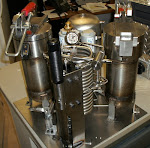Early production stage hydrogen generation company AlumiFuel Power, Inc. (“API”), the Philadelphia, Pennsylvania-based wholly owned operating subsidiary of AlumiFuel Power Corporation (OTCBB: AFPW ), announced today that it has made major advances in applying its technology to U.S. Navy Unmanned Underwater Vehicle (UUV) applications, and in positioning API for specific UUV program opportunities.
API has begun advanced design work on a prototype steam generator for Navy UUV applications (see API news release of January 4, 2010). The steam generator is based on the same powerful chemical reaction currently used in the PBIS-1000 portable hydrogen generator (see API news release of February 9, 2010). In this application, however, the exothermic reaction between water and aluminum is used to superheat steam to drive a turbine providing underwater propulsion. The prototype steam generator/turbine system will be sized to generate a constant 100W for several days, and start and stop capabilities will be built into the system. The calculated system energy density of the steam generator/turbine, after taking into account the efficiency of each component, is 5-10 times greater than the lithium-ion batteries currently being used for Navy UUV and submersibles applications.
API is also exploring the use of the superheated steam/hydrogen to run thermoelectric converters/generators, and the use of the generated hydrogen to power a fuel cell during operational periods where the vehicle would have access to air.
Based on recent visits and demonstrations, API believes there is a growing recognition on the part of the Navy and several major defense prime contractors that API’s technology may be a viable replacement for (or adjunct to) batteries to power underwater vehicles. As a result, API and potential partners are exploring an increasing number of specific R&D program opportunities for 2010 and 2011 that would fund further development of this advanced fuel source technology, which would ultimately lead to procurement involving multiple Navy platforms.
API’s director of engineering, Sean McIntosh, said, “This technology is more than an incremental increase in energy density – it is a giant leap forward. With this technology, UUVs will have an enormous increase in operational range, allowing them to complete missions that are currently impossible with today’s battery solutions.”
Subscribe to:
Post Comments (Atom)





No comments:
Post a Comment